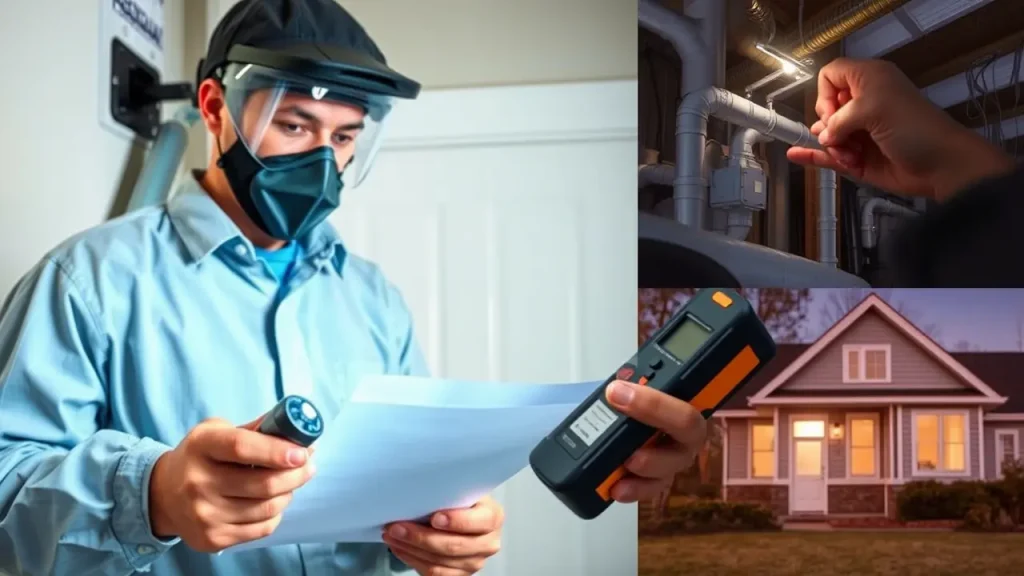The 2025 Home Inspection Checklist: How to Avoid Costly Surprises
The Home inspection for the residential real estate market has evolved significantly over recent years, making thorough pre-purchase inspections more valuable than ever. For prospective homeowners across America, these professional assessments provide crucial insights that can prevent costly mistakes and buyer’s remorse.
A comprehensive inspection report serves as both a protective measure and a strategic tool during what is likely to be one of life’s largest financial transactions. With housing prices continuing to climb in many markets nationwide, the modest cost of an inspection represents a small but significant investment in peace of mind.
Uncovering Hidden Issues Beyond Surface Appearances
Modern homes often present well on the surface while concealing significant structural or systemic problems. Fresh paint, strategic staging, and cosmetic renovations can effectively mask issues requiring substantial investment to remedy. For instance, a recently renovated bathroom in a Portland craftsman might showcase beautiful new tile and fixtures while hiding substandard plumbing that fails to meet current building codes.
Professional inspectors bring specialized equipment and expertise to identify these hidden concerns, from moisture detection devices that find water damage behind seemingly perfect walls to thermal imaging that can reveal invisible insulation gaps.
Negotiation Leverage Based on Professional Assessment
A detailed inspection report transforms abstract concerns into concrete negotiation points during the purchase process. When an inspection reveals that a Chicago-area home needs a new HVAC system or the foundation of a Phoenix property shows signs of settling, these documented issues provide objective grounds for price adjustments.
Rather than relying on general impressions or emotional responses, buyers can approach negotiations with specific dollar amounts attached to necessary repairs. This professional documentation often carries substantial weight in negotiations, frequently resulting in significant price reductions or seller-funded repairs.
Understanding Long-Term Maintenance Requirements
Beyond identifying immediate repair needs, thorough inspection reports provide valuable insights into future maintenance requirements and expenses. The detailed analysis of a home’s major systems, including roofing, electrical, plumbing, and HVAC, offers a roadmap for expected replacements and repairs in the coming years.
For example, learning that a roof has approximately five years of remaining useful life allows buyers to budget accordingly rather than facing an unexpected $15,000 expense shortly after purchase. This long-range planning perspective proves particularly valuable in older homes, where staggering major expenses become an important financial strategy.
Verification of Permitted Improvements and Additions
The inspection process helps verify that all improvements and additions to the property were completed with proper permits and according to local building codes. In many American suburbs, homeowners have added square footage, finished basements, or converted garages without obtaining necessary approvals. These unpermitted improvements can create significant complications for new owners, from insurance coverage limitations to difficulties with future resale. Professional inspectors familiar with local requirements can identify potentially problematic work that might not align with regional building standards, allowing buyers to address these issues before closing rather than inheriting complicated compliance problems.

Identifying Safety Concerns for Family Protection
Perhaps most importantly, home inspections highlight potential safety hazards that might otherwise go undetected until they cause harm. Throughout various regions of the country, these concerns can range widely, from radon issues in the Northeast to inadequate hurricane protection in Florida or outdated electrical systems in historic Midwestern properties.
Professional inspectors evaluate critical safety elements, including electrical systems, fire protection, structural integrity, and environmental hazards. For families with young children or elderly members, identifying and addressing these safety concerns before moving in can prevent accidents and provide invaluable protection for vulnerable household members.
Expediting Insurance Coverage and Financing
Most insurance companies and mortgage lenders now require verification of a property’s condition before finalizing coverage or financing. A comprehensive inspection report satisfies these requirements efficiently, streamlining both processes for buyers. In particularly competitive markets like Seattle or Austin, having inspection documentation ready can accelerate closing timelines, giving buyers an advantage when sellers are considering multiple offers.
Additionally, some insurance providers offer premium discounts for homes that have been professionally inspected and certified as meeting specific standards for roofing, electrical systems, and other critical components.
FAQ About Home Inspection Essentials
Q: What’s the difference between a standard home inspection and specialized inspections?
A: Standard home inspections cover general structural elements, major systems (electrical, plumbing, HVAC), and visible components of the property. Specialized inspections focus on specific concerns like radon testing, mold assessment, termite inspection, or septic system evaluation. For older homes or properties with unique features, these specialized assessments often provide critical information beyond the scope of standard inspections.
Most real estate professionals recommend starting with a comprehensive standard inspection, then adding specialized assessments based on initial findings or regional concerns.
Q: How long does a thorough home inspection typically take?
A: A professional inspection of an average single-family home (approximately 2,000-2,500 square feet) typically requires 2-3 hours to complete properly. Larger homes, older properties, or houses with multiple systems may require additional time, sometimes extending to 4-5 hours for thorough evaluation.
The inspection timeline includes not only the physical assessment but also documentation, photography, and in many cases, direct explanation of findings to prospective buyers. Rushing this process significantly reduces its value, as inspectors need adequate time to access all areas and test various systems under different conditions.
Q: What credentials should homebuyers look for when selecting an inspector?
A: The most reputable home inspectors hold certifications from recognized organizations like the American Society of Home Inspectors (ASHI), the International Association of Certified Home Inspectors (InterNACHI), or state-specific licensing where required. Beyond these baseline credentials, buyers should seek inspectors with extensive experience in the specific type of property being purchased, whether historic homes, new construction, or particular architectural styles like adobe in the Southwest or hurricane-resistant construction in coastal areas.
Additionally, inspectors who carry errors and omissions insurance provide an extra layer of protection for buyers relying on their assessment.
Q: Are new construction homes exempt from needing inspections?
A: Contrary to common belief, newly constructed homes benefit significantly from professional inspections, often revealing surprising deficiencies despite their recent completion. Construction oversights, subcontractor errors, and materials issues frequently appear in new builds across all price points.
Multiple inspection phases are recommended for new construction, including pre-drywall assessments that examine elements that will soon be hidden behind walls, followed by a final inspection before closing. In high-volume construction markets like suburban developments around Dallas or Charlotte, these inspections have become increasingly important as builders face labor shortages and accelerated timelines.
Q: How much should buyers expect to pay for a comprehensive home inspection?
A: Inspection costs vary by region, property size, and inspection scope, but typically range from $350 to $700 for standard single-family homes. Specialized assessments like radon testing, sewer scoping, or termite inspections generally incur additional fees ranging from $100 to $300 per service.
While budget-conscious buyers might be tempted by lower-cost options, quality inspections require proper time allocation, professional equipment, and extensive expertise – all of which justify professional-level compensation. When viewed as insurance against potential repair costs that can easily reach tens of thousands of dollars, even premium inspection services represent an exceptional value proposition.
Home Inspection Reports Conclusion
In today’s complex real estate market, professional home inspection reports have transformed from optional extras to essential components of informed purchasing decisions. These detailed assessments provide critical information about a property’s true condition beyond cosmetic appearances, enabling buyers to make confident decisions about one of life’s most significant investments.
From negotiating fair prices based on documented conditions to planning for future maintenance needs, inspection reports deliver multiple benefits throughout the purchase process and beyond. By approaching home buying with this professional guidance, purchasers can protect themselves from unexpected expenses, ensure family safety, and proceed with confidence in their investment decisions. The relatively modest cost of professional inspection services represents perhaps the best value-to-benefit ratio in the entire real estate transaction process.
